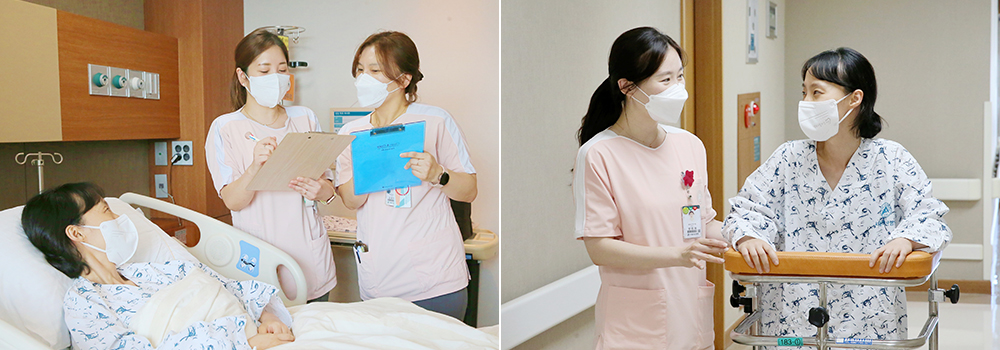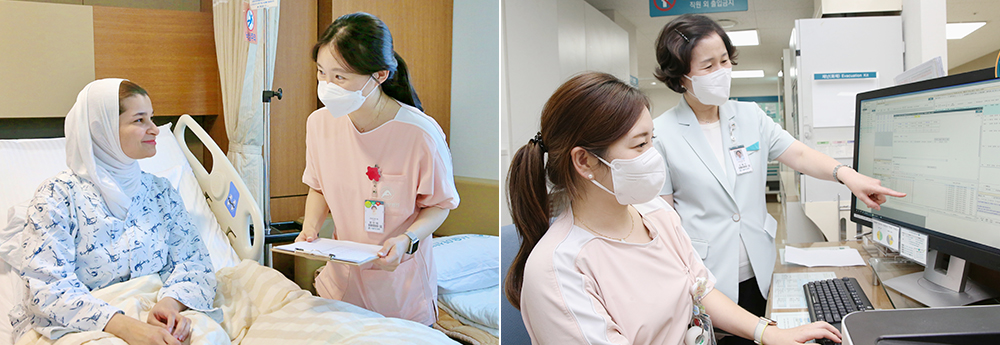-
- Global AMC MENU
- NEWS
- HEALTH
- PEOPLE
- Introduction
Ms. Mi Na Jang and Ms. Min Jae Bang of the Internal Medicine Nursing Team I
 ▲ [Left] Ms. Mi Na Jang (left) is receiving patient handover from Ms. Seong Mi Kim / [Right] Ms. Min Jae Bang and the patient are jointly conducting the DGT program
▲ [Left] Ms. Mi Na Jang (left) is receiving patient handover from Ms. Seong Mi Kim / [Right] Ms. Min Jae Bang and the patient are jointly conducting the DGT program
East Building 18th floor, providing delicate nursing for diverse patients
Patient-Centered Approach
Ms. Mi Na Jang’s daily routine begins by patient handover. Her tasks include closely monitoring even the slightest changes that may have occurred overnight. Despite having only four patients to attend to, each patient represents a different department: Rehabilitation Medicine, Gastroenterology, Otolaryngology, and Thoracic and Cardiovascular Surgery. As a result, the nursing care required for each patient varies significantly. Within Ward 183, which typically admits VIP patients, international patients, or those awaiting regular ward assignment, a team of 22 nurses is on duty.
For patients from the Department of Rehabilitation Medicine, who have been hospitalized for extended periods, their daily schedules are always busy. Ms. Jang finds a sense of rejuvenation when she meticulously completes the basic nursing care checklist, which includes tasks such as toothbrushing, diaper changes, and managing bedsores. Additionally, when preparing for the discharge of an international patient, she collaborates with the responsible physician and the International Healthcare Center. By gaining a comprehensive understanding of the patient, she serves as a communication channel between various departments, the responsible medical team, and the patient.
Setting daily goals and collaborating toward achievement
DGT program
"Shall we engage in eight sets of ten-minute breathing exercises today?" The patient shook his head and said “Eight minutes!” Ms. Min Jae Bang quickly suggested, "Okay, nine minutes then!" She promptly recorded today's goal on the board. Every morning, an interesting discussion takes place between the nursing staff and the patients. This dynamic occurs due to the implementation of the DGT (Daily Goal Tool) program in Ward 183. The program aims to provide essential nursing care for patients. When daily goals for exercise or meal intake are established jointly with the nurses, patients become doubly determined to achieve these objectives with the support and encouragement of the nursing staff. For Ms. Bang, this process is not only crucial for monitoring daily changes but also for gaining a detailed understanding of her patients and sharing their experiences with their families. She cherishes a heartfelt letter received from the spouse of a patient who battled brain cancer and eventually passed away in the ICU. Despite feeling regretful for not bidding a proper farewell, the patient's spouse expressed gratitude to all the nurses in the ward through handwritten letters, appreciating their care and effort, regardless of the treatment outcome. Ms. Bang treasures this letter, keeping it safely in her hospital locker.
 ▲ [Left] Ms. Min Jae Bang is engaging in a conversation with an Arab patient. / [Right] Ms. Mi Na Jang (left), is inspecting the patient's situation together with Ms. Hae Ji Kook, the Unit Manager.
▲ [Left] Ms. Min Jae Bang is engaging in a conversation with an Arab patient. / [Right] Ms. Mi Na Jang (left), is inspecting the patient's situation together with Ms. Hae Ji Kook, the Unit Manager.
Cultural sensitivity in providing nursing care for international patients
Acknowledging differences
Ms. Bang ensures she informs the patient in advance about the impending doctor's rounds, saying, "The doctor's rounds will begin soon. Please be prepared!" She recognizes the cultural norms and restrictions of Arabic women, who are not permitted to expose their hair or flesh to men, including doctors. During Ramadan, Ms. Bang adjusts after-meal medication timings to accommodate fasting intervals. She utilizes her spare time to study foreign languages, enabling her to communicate more effectively with patients. While she receives assistance from interpreters, a simple personal greeting such as "Shukran" (Thank you) swiftly bridges the gap between her and the patient. Sometimes, Ms. Bang finds herself questioning, "Why did the patient think that way?" or "Why did the patient say that?" It is through cultural differences that she discovers the answers.
There was a significant incident involving an Arab patient who struggled during their final moments. The patient's family refused to discontinue life-sustaining treatment, as they believed it was aligned with God's will. Despite performing CPR and cardiac examinations, the patient eventually passed away. Ms. Bang felt a sense of remorse for not being able to provide a more comfortable ending. Nevertheless, the patient's family expressed gratitude to the medical staff for not giving up and continuing treatment. Satisfied with the quality of treatment and services at AMC, the family returned to their home country. Through such experiences, Ms. Bang accumulates further knowledge to better understand the needs of international patients.
Taking responsibility and going the extra mile
Promise made to myself
Ms. Jang, an experienced nurse who joined AMC in 2018, had experience working in the Department of Neurosurgery. Upon being assigned to Ward 183, which features VIP rooms, she felt an undue burden and approached her work with caution. Initially, she associated the term "VIP" with what she had seen in television series. However, she soon realized that the most crucial aspect was attending to patients with diverse conditions. Numerous demands were subsequently placed upon her. She diligently studied patient orders, diseases, and cancer treatment protocols as if she were a novice in the nursing field. Whenever she encountered something unfamiliar or lacked experience, senior nurses were always willing to assist her, reassuring her with the words, "It's okay not to know. Don't worry." It was only when she became proficient in nursing and gained a comprehensive understanding of the ward's overall situation that she could confidently and proactively respond. Gradually, she adapted to her role in an environment that fostered independent learning and growth.
One day, a new patient arrived on the ward, visibly consumed by anger. Since no regular rooms were available, the patient was assigned to Ward 183. Ms. Jang took the initiative to address a potentially uncomfortable topic, saying, "You may be concerned about the VIP room's hospitalization fee, right? Now that you're here, please relax for today. I will regularly check on other beds as well." Merely knowing that the nurse empathized with their feelings helped to calm the patient down. Therefore, Ms. Jang always promises herself to provide nursing care that is not only compassionate but also empathetic. Regardless of the requests she receives, she responds gallantly, saying, "I will take care of it!"












